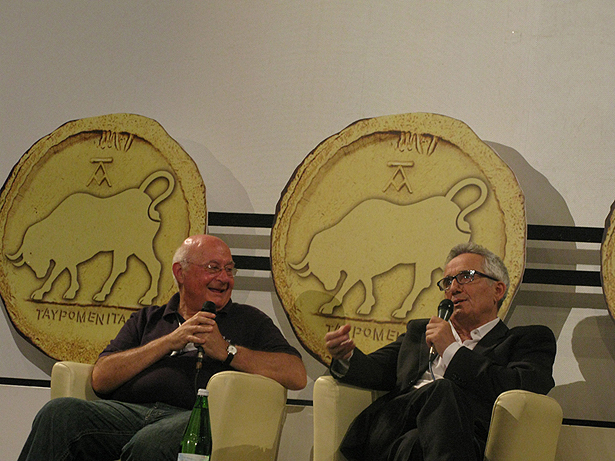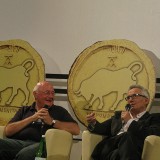I was looking forward to this event to be able to have unmediated impressions in real time about one of the most important directors in Italian cinema who started his career in 1965, while living in London with a remarkable masterpiece: I pugni in tasca – Fists in the Pocket.
I came early to get a close seat in the first rows. I am surrounded with young film students in their early twenties that are busy texting and convivially chatting away. In the back are sitting some older folks with serious expressions. Photographers are everywhere with their cameras at the ready, which builds up a tension as if a spaceship from Mars is about to land any second.
With the customary 15 minutes delay, Debora Young, the Festival director opens up with a few words of introduction after which Maestro Bellocchio is ushered onto the stage that in instant becomes a focal point of million camera flashes.
 Master class with Marco Bellocchio
Master class with Marco Bellocchio
Interviewing Bellocchio is Dan Fainaru (Internal Communications) that poses wide range of questions about various milestones in his rich career. No English translation is provided, so I am glad all these years of Saturday Italian classes are effectively kicking in. Here are some insights I found the most interesting:
- Cinematic approach taken by young students: Bellocchio sees today’s young film students as very proficient in mastering the technical aspects of producing an effective soundtrack or solid camera angles, giving an example of the other day’s Short films shown or a typical reality TV shows that generated an audience-wide jeer. What they most lack of is a good script and a credible recital. He points out that in the Neorealism period, non-professional actors although used banal dialogs, they were extremely genuine as they reflected real people telling their own stories in their natural habitat.
- Dubbing: Bellocchio outlines two stages in the evolution of dubbing (i.e., use of professional voiceover artists instead of the actors’ own voice): 1) when he started out back in 1965 it was a common practice. In the case of I pugni in tasca (Fists in the Pocket), it was rather a necessity as Lou Castel, the lead actor did not speak Italian fluently. He also gave an example of many directors including Fellini that shot scenes with complete dialogs only to change them entirely at the dubbing stage. 2) Around the 80’s he ditched dubbing, as it has become outdated practice no one considered valid anymore.
- Italian Cinema today: Bellocchio teaches classes in directorship and screenplay writing. Regarding global cinema, he points out that even back in the 50’s 3D movies were popular, they disappeared and now are back in vogue, referring to the other day’s opening of Toy Story 3 in the Teatro Greco (Greek Theater). He didn’t say it explicitly but I found it as an acknowledgment that these are all technology muscles, but with no soul. As for Italian cinema, he confessed that classic Italian cinema, namely Neorrealism, had to its advantage extremely tough economic post-war conditions as backdrop, which enabled to tell much more believable stories about human poverty, loss of job and other survival challenges. With the help of an audience member sitting at the front row he summed up a common quote that aptly summed up the current thinking:
“Italian cinema today is inferior to the sum of its parts”
I do hope we won’t need another war to improve quality, as I believe there are great contemporary gems from Tornatore, Ozpetek, Salvatores, Sorrentino, Solidini and many others that brought forward new directions and perspectives in tune with the times. That said, it was a bit unsettling when I stopped at a local DVD store and the only titles for sale were American blockbusters. It could be a coincidence or cold business sense but still telling.

